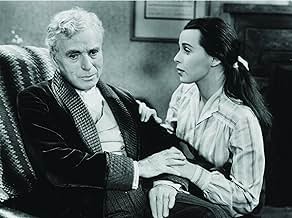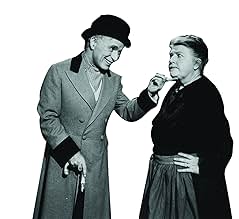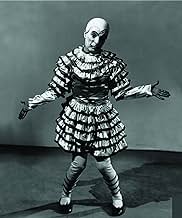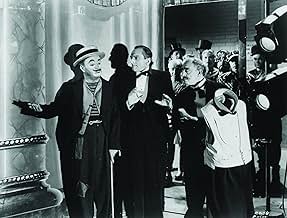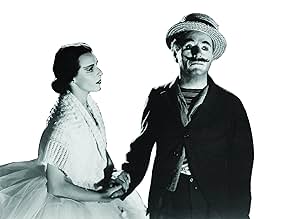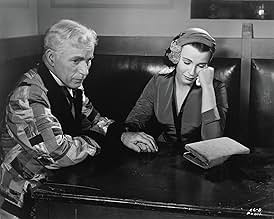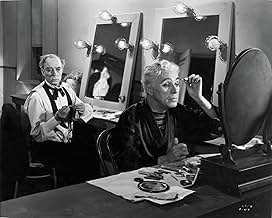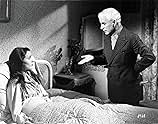IMDb-BEWERTUNG
8,0/10
23.397
IHRE BEWERTUNG
Ein alternder Komiker und eine suizidale Balletttänzerin kümmern sich umeinander und finden so wieder Hoffnung und einen Sinn in ihrem Leben.Ein alternder Komiker und eine suizidale Balletttänzerin kümmern sich umeinander und finden so wieder Hoffnung und einen Sinn in ihrem Leben.Ein alternder Komiker und eine suizidale Balletttänzerin kümmern sich umeinander und finden so wieder Hoffnung und einen Sinn in ihrem Leben.
- 1 Oscar gewonnen
- 7 Gewinne & 4 Nominierungen insgesamt
Molly Glessing
- Maid
- (as Mollie Glessing)
Leonard Mudie
- Dr. Blake - Calvero's Doctor
- (as Leonard Mudi)
'Snub' Pollard
- Street Musician
- (as Snub Pollard)
Billy Lee Aimone
- Little Boy
- (Nicht genannt)
Empfohlene Bewertungen
Haunting and unforgettable piece from Charles Chaplin that was nearly lost in the American cinema all together. It played in very few cities within the U.S. in 1952 and was never shown in Los Angeles due to the suspicion that the House of Un-American Acts Committee had concerning Chaplin (making no sense to me as Chaplin, who was British, was the polar opposite of a Communist from all indications). The film disappeared from U.S. soil and did not re-surface until some 20 years later in 1972 and Chaplin actually won an Oscar, with fellow scorers Raymond Rasch and Larry Russell, for this movie's original dramatic score (this was the only competitive Oscar Chaplin ever won). Chaplin stars as a washed-up vaudeville performer. He is now an elderly man (in his 60s when the film was made) and the spotlight is gone forever, even though he still secretly yearns for it. Chaplin discovers a very young ballet dancer (Claire Bloom) who has attempted suicide because she cannot handle being a performer. Naturally Chaplin cannot believe that this young, beautiful and talented woman would rather take her life than be a ballet performer (the fact that Chaplin yearns for her youth and the ability to be an entertainer again makes him bound and determined to get her back on her feet). He tries with all his might to get her performance-ready again, all the while he is also trying to resurrect the career that he lost long ago. Chaplin has a dream of a stunning performance he has on the stage, but when his act ends there is no one there to acknowledge him (one of, if not the saddest sequences I have ever seen on film). Soon it becomes obvious that Chaplin's time is running out and his desperation to have that one last piece of action engulfs his mind, body, heart and soul. "Limelight" is one of the most dramatic and intense pictures I have ever encountered. Chaplin's life and career had changed dramatically by 1952. The Little Tramp was no more, all movies had sound, some films were being made in color and the subject matter of motion pictures was slowly starting to change. In many ways Chaplin was trying to show the viewing public his life in celluloid form and "Limelight" would be the vehicle used. This is a stunning work that once again shows the humanity and overall sensitivity that Chaplin had with his movies. Chaplin's long-time rival in real-life (Buster Keaton) even shows up late and acts as a partner in the duo's stage routine. The pairing is usually the most memorable part of this production to most, but the story and the deep emotional part that Chaplin plays are the things that make "Limelight" quite possibly Chaplin's greatest cinematic masterpiece. 5 stars out of 5.
Charlie Chaplin was without a doubt one of the most important pioneers of film-making, and through his life he saw the development of the cinema and its progress. "Limelight" is probably not as well known as most of his silent feature, but it is a very important film to understand the vivacious mind of this genius. It is a very personal film that showcases Chaplin's feelings about his own brand of comedy and how it slowly lost the public's attention as he grew older.
"Limelight" is the story of an old comedian named Calvero (Chaplin), who one morning discovers that his young neighbor Thereza (Claire Bloom) attempted to commit suicide. He decides to take care of her and discovers that she is a dancer; knowing that both share a passion for performing he begins to cheer her up and prepares her to become a great dancer while at the same time he remembers his past glories.
When one watches "Limelight" is impossible not to see the many autobiographical aspects of the plot, as in many ways, Calvero represents how Chaplin feels at the modernization of comedy on stage. Like Chaplin, Calvero also played the character of an optimist tramp who always saw the good side of life, and like Chaplin, Calvero faced many times the urge to modernize his act. It's kind of frightening to think about how much of Calvero's story could be based on Chaplin's real experiences as it is a sharp criticism (for its time) to the way performers are treated by both their managers and their public.
As the last of his "talkies" made in America, "Limelight" is done with all the power Chaplin still had (although the film would be banned as Chaplin lost his power due to his political opinions) and it shows. The stage performances of the characters are sublime and in Calvero's memories Chaplin resurrects a way of comedy apparently dead by the early 50s and makes it fresh. The Keaton/Chaplin duo is a classic moment captured on film. However, "Limelight" is not a comedy in the strict sense of the word. Those expecting a laugh-riot like "Modern Times" or "The Great Dictator" will be disappointed, this is a very personal melodrama where Chaplin his emotions about his career.
The acting is very good, Chaplin may be more remembered for his parts in silent films, but he delivers his lines with ease and ability. His physical comedy is superb and his overall performance is memorable (mainly because it feels as if he was playing himself). Claire Bloom is at times a bit too melodramatic for the movie's sake, but for the most part is very effective and makes a good counterpart to Chaplin's Calvero. Among the supporting cast Nigel Bruce as always chews the scenery and Buster Keaton is simply fabulous in his small yet classic role.
Probably "Limelight"'s main problem is its excess of melodrama, and its at times, excessively preachy attitude. The fact that is not a comedy may turn off people not used to Chaplin's more serious side, as while the movie has its fair share of laughs, it is obvious that Chaplin wanted to be recognized as more than a mere clown. The movie's slow pace and rhythm also put it closer to the melodrama of the 40s than to the image we are all used to see when we think of Chaplin.
Despite all this, "Limelight" stands as a testament of Chaplin's enormous talent, and while not very well-known, it is one of the finest films he ever did. Fans of his work will definitely enjoy this film and fans of Keaton will appreciate his small yet terrific scene. 9/10
"Limelight" is the story of an old comedian named Calvero (Chaplin), who one morning discovers that his young neighbor Thereza (Claire Bloom) attempted to commit suicide. He decides to take care of her and discovers that she is a dancer; knowing that both share a passion for performing he begins to cheer her up and prepares her to become a great dancer while at the same time he remembers his past glories.
When one watches "Limelight" is impossible not to see the many autobiographical aspects of the plot, as in many ways, Calvero represents how Chaplin feels at the modernization of comedy on stage. Like Chaplin, Calvero also played the character of an optimist tramp who always saw the good side of life, and like Chaplin, Calvero faced many times the urge to modernize his act. It's kind of frightening to think about how much of Calvero's story could be based on Chaplin's real experiences as it is a sharp criticism (for its time) to the way performers are treated by both their managers and their public.
As the last of his "talkies" made in America, "Limelight" is done with all the power Chaplin still had (although the film would be banned as Chaplin lost his power due to his political opinions) and it shows. The stage performances of the characters are sublime and in Calvero's memories Chaplin resurrects a way of comedy apparently dead by the early 50s and makes it fresh. The Keaton/Chaplin duo is a classic moment captured on film. However, "Limelight" is not a comedy in the strict sense of the word. Those expecting a laugh-riot like "Modern Times" or "The Great Dictator" will be disappointed, this is a very personal melodrama where Chaplin his emotions about his career.
The acting is very good, Chaplin may be more remembered for his parts in silent films, but he delivers his lines with ease and ability. His physical comedy is superb and his overall performance is memorable (mainly because it feels as if he was playing himself). Claire Bloom is at times a bit too melodramatic for the movie's sake, but for the most part is very effective and makes a good counterpart to Chaplin's Calvero. Among the supporting cast Nigel Bruce as always chews the scenery and Buster Keaton is simply fabulous in his small yet classic role.
Probably "Limelight"'s main problem is its excess of melodrama, and its at times, excessively preachy attitude. The fact that is not a comedy may turn off people not used to Chaplin's more serious side, as while the movie has its fair share of laughs, it is obvious that Chaplin wanted to be recognized as more than a mere clown. The movie's slow pace and rhythm also put it closer to the melodrama of the 40s than to the image we are all used to see when we think of Chaplin.
Despite all this, "Limelight" stands as a testament of Chaplin's enormous talent, and while not very well-known, it is one of the finest films he ever did. Fans of his work will definitely enjoy this film and fans of Keaton will appreciate his small yet terrific scene. 9/10
Charles Chaplin stars as Calvero, an alcoholic, washed-up music hall comedian who saves a rooming house neighbor from committing suicide when he passes by her door and smells gas. The neighbor, young ballet dancer Thereza (Claire Bloom), attempted suicide because she believes that she will never walk and therefore never dance again. She stays with Calvero while she recuperates, and the old comic starts to improve himself as he sets out to get Thereza the chance to prove herself as a world-class dancer. Thereza wants to marry Calvero in spite of their large age difference (I won't go into how art is imitating life here), but he feels that a young composer (Sydney Earl Chaplin) would be a better match. Complications ensue.
Chaplin's last starring role came in this bittersweet drama, a massive hit everywhere else in the world, but barely released in the U. S. due to Chaplin being labeled a "dangerous leftist". I had the same opinion of this that I did with many of his silent movies: it's technically proficient, but the sentimentality is a bit too thick, and it often seems blatantly phony, and not earned by what has been shown on screen. I've grown to like many of Chaplin's films on repeat viewings, and even love a couple of them, but I've always preferred the work of Buster Keaton. It was nice seeing the two on screen together, but it wasn't for long enough. The movie eventually received an Oscar-qualifying premiere in L. A. twenty years later, and thus bizarrely won the 1972 Oscar for Best Score (Charles Chaplin, Ray Rasch, and Larry Russell).
Chaplin's last starring role came in this bittersweet drama, a massive hit everywhere else in the world, but barely released in the U. S. due to Chaplin being labeled a "dangerous leftist". I had the same opinion of this that I did with many of his silent movies: it's technically proficient, but the sentimentality is a bit too thick, and it often seems blatantly phony, and not earned by what has been shown on screen. I've grown to like many of Chaplin's films on repeat viewings, and even love a couple of them, but I've always preferred the work of Buster Keaton. It was nice seeing the two on screen together, but it wasn't for long enough. The movie eventually received an Oscar-qualifying premiere in L. A. twenty years later, and thus bizarrely won the 1972 Oscar for Best Score (Charles Chaplin, Ray Rasch, and Larry Russell).
A washed-up, formerly-famous Music Hall comic, Charlie Chaplin, saves a suicidal ballerina, Claire Bloom. In the process of giving her the hope to move on and succeed, he regains the confidence to return to the stage himself.
"Limelight" is a moving and autobiographical film that works as both a bittersweet drama and a mirror into the soul of one of the world's greatest film makers. I sometimes wondered if my affection for this film is based on my knowledge of Chaplin's life and career, and the parallels between "Limelight" and people and incidents in his own life. When I watch this film I see an artist standing naked at a crossroads before his audience, unsure where to go and what to do. However, I know the film does not require an advanced degree in Chaplin to enjoy. My wife, who could probably do little more than identify the Tramp in a lineup before marrying me, loved this film before she met me. I have also had the good fortune to see the film in a theater in New York and watch it work its wonders on an audience. Stylistically, it might be dated, but the magic lingers.
"Limelight" is best viewed as a drama with comedy rather than a comedy with drama. Outwardly, it is the simple story of a vulnerable youth who mistakes her gratitude for love, and an older man wise enough to know the difference. But it's more than that too. It's about an artist's nature, and the addictive power of applause. The Chaplin character, Calvero, knows how to make people laugh, but feels he has lost the ability to do so. He realizes he is at the end of his career, but he still hungers for one final moment in the limelight. The film is talky and philosophical, and, yes, a little pompous and pretentious at times too. It's almost as if Chaplin is trying to impart through words the simple joys and mystery of life he was once able to express effortlessly through simple slapstick alone. Does this flood of words mean Chaplin has lost his skills as a film maker? No. He still has the power to move.
"Limelight" is Chaplin's final masterpiece. It is one of my favorites. I prefer to think of it as his last film. Should this be your first Chaplin film? No. Start with films like "The Gold Rush," "City Lights," and "The Great Dictator." Come to know the comedian before you get to know the man.
"Limelight" is a moving and autobiographical film that works as both a bittersweet drama and a mirror into the soul of one of the world's greatest film makers. I sometimes wondered if my affection for this film is based on my knowledge of Chaplin's life and career, and the parallels between "Limelight" and people and incidents in his own life. When I watch this film I see an artist standing naked at a crossroads before his audience, unsure where to go and what to do. However, I know the film does not require an advanced degree in Chaplin to enjoy. My wife, who could probably do little more than identify the Tramp in a lineup before marrying me, loved this film before she met me. I have also had the good fortune to see the film in a theater in New York and watch it work its wonders on an audience. Stylistically, it might be dated, but the magic lingers.
"Limelight" is best viewed as a drama with comedy rather than a comedy with drama. Outwardly, it is the simple story of a vulnerable youth who mistakes her gratitude for love, and an older man wise enough to know the difference. But it's more than that too. It's about an artist's nature, and the addictive power of applause. The Chaplin character, Calvero, knows how to make people laugh, but feels he has lost the ability to do so. He realizes he is at the end of his career, but he still hungers for one final moment in the limelight. The film is talky and philosophical, and, yes, a little pompous and pretentious at times too. It's almost as if Chaplin is trying to impart through words the simple joys and mystery of life he was once able to express effortlessly through simple slapstick alone. Does this flood of words mean Chaplin has lost his skills as a film maker? No. He still has the power to move.
"Limelight" is Chaplin's final masterpiece. It is one of my favorites. I prefer to think of it as his last film. Should this be your first Chaplin film? No. Start with films like "The Gold Rush," "City Lights," and "The Great Dictator." Come to know the comedian before you get to know the man.
Charlie Chaplin is one of the undisputed masters of the cinema. He was one of the funniest actors of the cinema, and he was also one of the greatest directors. Of course, the films that he is most famous for are his silent comedies, especially The Gold Rush, City Lights, and Modern Times. The latter two were the product of Chaplin's stubborn clinging to the format and conventions of the silent cinema, though everyone else had gone to sound. This stubbornness was certainly sound. His contemporaries such as Buster Keaton and Harold Lloyd lost popularity when they moved to sound. Chaplin's last two silent films were popular and made a lot of money. Audiences may have craved sound, but they craved Chaplin, too, and did not disdain his silence. He was one of the silent artists who thought that they were just achieving the peak of their medium when sound came in. He proved himself right, since City Lights (1931) and Modern Times (1936) are probably his two best films, and both are two of the best films ever made.
Finally, in 1940, Chaplin directed and starred in his first talkie, The Great Dictator. Three more followed, Monsieur Verdoux, then Limelight, then King of New York, which happens to be the only one of these four I have not seen. The Great Dictator and Monsieur Verdoux were both good films in their own way, but perhaps Chaplin's in depth political commentary in these films detracted from them. The type of comedy that you find in his silent films did not mix well with this social commentary. The simple juxtapositions of the worlds of the poor and the rich in City Lights and Modern Times were far more powerful than what his first two talkies had to offer.
Then came Limelight, one of the most bittersweet films ever made. It is not perfect, but it achieves a grand melodramatic beauty that few films have ever even approached. The story is simple: a washed-up, old vaudvillian rescues a young ballet dancer from suicide. He takes care of her until she is healthy again, and even restores her confidence. The story may be simple, but the character dynamics are very complex. As the dancer, Theresa, is recovering, Calvero is not only rebuilding her confidence, but also his own. Theresa, because of his kindness towards her, finally believes she has fallen in love with him, even going so far as proposing marriage to him. Whether she actually loves him or not, and Calvero strongly asserts that she shouldn't and doesn't, these two characters have a constantly evolving relationship that does not end until the credits role. It is utterly fascinating, captivating, and dramatic.
There are a couple of problems, and though they're small, they deserve attention. Perhaps the biggest problem is that Claire Bloom is quite guilty of overacting. Her line delivery is bizarre and overdramatic. This isn't a big deal, since you ought to be keenly aware that the film takes place in the world of melodrama, and is thus exaggerated. Another thing that irked me is Buster Keaton's role. It is little more than a cameo. In fact, his character doesn't even have a name in the credits. This is truly disappointing, seeing that he, although Chaplin may have had the most heart, was the all-around funniest silent comedian.
Finally, in 1940, Chaplin directed and starred in his first talkie, The Great Dictator. Three more followed, Monsieur Verdoux, then Limelight, then King of New York, which happens to be the only one of these four I have not seen. The Great Dictator and Monsieur Verdoux were both good films in their own way, but perhaps Chaplin's in depth political commentary in these films detracted from them. The type of comedy that you find in his silent films did not mix well with this social commentary. The simple juxtapositions of the worlds of the poor and the rich in City Lights and Modern Times were far more powerful than what his first two talkies had to offer.
Then came Limelight, one of the most bittersweet films ever made. It is not perfect, but it achieves a grand melodramatic beauty that few films have ever even approached. The story is simple: a washed-up, old vaudvillian rescues a young ballet dancer from suicide. He takes care of her until she is healthy again, and even restores her confidence. The story may be simple, but the character dynamics are very complex. As the dancer, Theresa, is recovering, Calvero is not only rebuilding her confidence, but also his own. Theresa, because of his kindness towards her, finally believes she has fallen in love with him, even going so far as proposing marriage to him. Whether she actually loves him or not, and Calvero strongly asserts that she shouldn't and doesn't, these two characters have a constantly evolving relationship that does not end until the credits role. It is utterly fascinating, captivating, and dramatic.
There are a couple of problems, and though they're small, they deserve attention. Perhaps the biggest problem is that Claire Bloom is quite guilty of overacting. Her line delivery is bizarre and overdramatic. This isn't a big deal, since you ought to be keenly aware that the film takes place in the world of melodrama, and is thus exaggerated. Another thing that irked me is Buster Keaton's role. It is little more than a cameo. In fact, his character doesn't even have a name in the credits. This is truly disappointing, seeing that he, although Chaplin may have had the most heart, was the all-around funniest silent comedian.
Wusstest du schon
- WissenswertesThe Academy Award that Sir Charles Chaplin won for composing this film's score is the only competitive Oscar he ever received; his other awards were given to him for special achievement outside of the established categories.
- PatzerIn discussing the ballet with the cast, the dance director Bodalink casts a giant shadow in front of the auditorium seats (revealing it to be nothing more than a backdrop).
- Crazy Credits"The glamour of limelight, from which age must pass as youth enters."
- Alternative VersionenThe version of the film that premiered in London in 1952 ran 141 minutes. It had been in distribution for several months, when Charles Chaplin recalled film prints and deleted a scene in which Calvero leaves the sleeping Thereza, and goes to a bar, where he meets his old friend Claudius, the arm-less violin player, who gives Calvero money. The film ran 137 minutes after this scene was edited out for worldwide distribution. In the ending credits, there is still a billing for Stapleton Kent as Claudius, even though he is no longer seen in the film. The DVD includes the deleted scene as an extra feature.
- VerbindungenEdited into Geschichte(n) des Kinos: Une histoire seule (1989)
Top-Auswahl
Melde dich zum Bewerten an und greife auf die Watchlist für personalisierte Empfehlungen zu.
- How long is Limelight?Powered by Alexa
Details
- Erscheinungsdatum
- Herkunftsland
- Offizielle Standorte
- Sprache
- Auch bekannt als
- Candilejas
- Drehorte
- Produktionsfirma
- Weitere beteiligte Unternehmen bei IMDbPro anzeigen
Box Office
- Weltweiter Bruttoertrag
- 9.291 $
- Laufzeit
- 2 Std. 17 Min.(137 min)
- Farbe
- Seitenverhältnis
- 1.37 : 1
Zu dieser Seite beitragen
Bearbeitung vorschlagen oder fehlenden Inhalt hinzufügen


